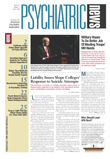A multisite clinical trial of treatments for alcohol dependence shows that when combined with medical management, the medication naltrexone is as effective as up to 20 sessions of a type of behavioral therapy in terms of reducing drinking.
Findings from the Combined Pharmacotherapies and Behavioral Interventions (COMBINE) study also showed that the medication acamprosate had no effect on reducing drinking and no added benefit when combined with naltrexone.
The findings appear in the May 3 Journal of the American Medical Association.
Naltrexone is an opiate antagonist. Although it was originally used to treat opioid dependence, the Food and Drug Administration also approved it for alcoholism.
Acamprosate is a glutamate receptor modulator and is thought to reduce the discomfort associated with protracted abstinence from alcohol.
Roger Weiss, M.D., principal investigator for the McLean Hospital study site, told Psychiatric News that he found the results encouraging and said he thought it would be feasible to treat alcohol-dependent patients with naltrexone and/or combined behavioral therapy with medical management in both primary care offices and mental health treatment centers.
To assess the effect of a number of treatments on alcohol addiction, researchers at 11 treatment centers across the United States gathered data on 1,383 recently abstinent alcohol-dependent subjects recruited through advertisements or referrals.
The more than 1,000 subjects were randomly placed in one of nine treatment groups (of about 150 patients each) for 16 weeks of outpatient treatment: patients in eight of the groups received medical management from a clinician who reviewed patients' diagnosis of alcohol dependence with them, recommended abstinence from alcohol, and discussed patients' overall functioning and medication adherence.
Patients in four of the groups also received up to 20 50-minute sessions of a combined behavioral intervention (CBI), which integrated motivational interviewing, aspects of cognitive-behavioral therapy, and encouragement to participate in 12-step groups.
Motivational interviewing was described as a nonconfrontational style of interviewing patients that involved empathy, helped patients to reflect on their choices, and assessed the patient's strengths.
Four groups of patients also received one of the following: naltrexone (100 mg a day), acamprosate (3 g a day), a combination of the two drugs, or placebo. The placebo group received CBI alone.
Researchers assessed the patients at several time points during the 16-week treatment trial and up to a year after the treatment trial to determine the percentage of days abstinent from alcohol and the time to the first heavy-drinking day (defined as four or more drinks a day for women and five or more for men).
They also assessed the odds of good clinical outcome, defined as abstinence or moderate drinking with no alcohol-related problems.
During the treatment period, patients receiving naltrexone plus medical management (n=302), CBI plus medical management and placebo (n=305), or both naltrexone and CBI plus medical management (n=309) had a higher percentage of days abstinent (80.6 percent, 79.2 percent, and 77.1 percent, respectively) than the 75 percent of days abstinent in groups receiving placebos and medical management only (n=305).
The interaction of naltrexone and CBI was statistically significant at p=.009, according to the study.
Naltrexone plus medical management was also found to reduce the risk of having a heavy-drinking day over the study period (p=.02).
The study also found that those receiving CBI without medication or medical management (n=157) had a lower percentage of days abstinent from alcohol (66.6 percent) than did those receiving placebo plus medical management alone (n=153) or placebo plus medical management and CBI (n=156) (73.8 percent and 79.8 percent, respectively).
One year after treatment, there were similar differences between the groups, but none was statistically significant. Moreover, acamprosate showed no effect on drinking, either alone or with any combination of naltrexone, CBI, or both.
Weiss noted that while CBI is best conducted by a specialist with training in alcohol dependence treatment, medical management can be conducted in the primary care setting by a wide range of health clinicians.
He said that researchers are continuing to analyze data from the COMBINE study to identify predictors of good clinical outcomes in regard to recovery from alcohol dependence.
The study was funded by the National Institute on Alcohol Abuse and Alcoholism.
